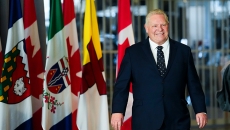Anyone who wants to register to vote in the April 28 federalelection has to be able to prove who they are and where they live.
Elections Canada realizes both of those things can be a challenge for someone without a home or standard ID cards, said spokesperson Diane Benson.
If an unhoused person uses services at a shelter orcommunity kitchen, that facility may be able to provide a letter saying the voter resides there, she said. For example, someone living in an encampment who frequents a soup kitchen could get a letter of confirmation from that facility, said Benson.
And Elections Canada accepts a wide range of information to confirm someone's identity, from hospital bracelets to labels on prescription containers, she said. Other forms of accepted ID include public transportation cards, government benefits statements or cheque stubs, or a hospital or medical clinic card.
"We know people who are homeless face barriers in trying to prove who they are and where they live, particularly theresidence issue," Benson said. "We get a better understanding of the challenges they face by working with the community groups that know them best."
Susan Smith, chair of the lived experience council with End Homelessness St. John's, N.L., said she was able to vote while unhoused by having a registered voter — a friend — come along and vouch for her.
"If you have someone in your neighbourhood that you know who is experiencing homelessness and doesn't have access to identification or proof of address, bring them along with you," Smith said.
Any registered voter can vouch for someone as long as thevoter can provide that person's identity and residence, Benson said. A registered voter can only vouch for one other person.
People can register to vote at Elections Canada offices oronline until April 22, according to the voting agency's website. They can also register at the polls on advance polling days oron the April 28 election day.






